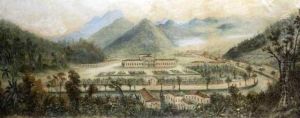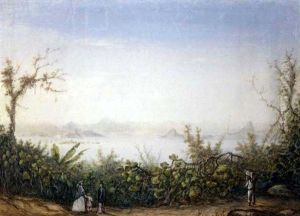Friedrich Hagedorn Paintings
Friedrich von Hagedorn, born on April 23, 1708, in Hamburg, Germany, was a poet who is often considered one of the foremost German poets of the early Enlightenment era. His works are noted for their wit, worldly wisdom, and the use of French and English literary models, which he adapted with a German sensibility. Hagedorn is known for his lyrical poems, fables, and satires which reflect the influence of the Enlightenment's rationalist and humanist thought.
After studying law at the University of Jena from 1726 to 1729, Hagedorn returned to Hamburg where he held a minor government position. However, his passion for poetry and literature was his primary focus. As secretary to the English ambassador in Hamburg, he became acquainted with contemporary English literature, a connection that would greatly influence his own writing. He became one of the first German poets to incorporate the ease and simplicity of English poetic forms into German verse, thus contributing to the development of a more cosmopolitan literary culture in Germany.
Hagedorn's early works were light-hearted and Rococo in spirit, as exemplified by his collection 'Versuch einiger Gedichte' (1738), which included Anacreontic poems that celebrated love, wine, and sociability. The influence of Alexander Pope, Jonathan Swift, and other English satirists was evident in his work, but Hagedorn gave these forms a distinctly German flavor through the incorporation of local settings and themes. His later works, such as the fable collections 'Fabeln und Erzählungen' (1738) and 'Neue Fabeln und Erzählungen' (1744), demonstrated his skill in this genre, which was popular during the Enlightenment for its ability to cloak moral and social criticism in allegory.
Throughout his life, Hagedorn remained a key figure in the literary circles of Hamburg, and his salon was a meeting place for the city's intellectuals. His poetry and fables not only entertained but also served as vehicles for moral instruction and critique of contemporary society. He remained unmarried and devoted himself to his literary pursuits until his death on October 28, 1754, in his hometown.
Hagedorn's legacy lies in his role as a pioneer of the Enlightenment in Germany and his efforts to bring the wit and style of English literature to a German audience. His light and elegantly crafted verses set the tone for a new phase in German poetry, moving away from the heavily ornamented baroque style towards simplicity, clarity, and a touch of irony. Although his name may not be as widely recognized today as some of his contemporaries, his contributions to the development of German literature are significant, and he is remembered as an important figure in the literary history of the 18th century.









